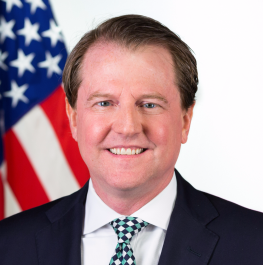White House counsel reportedly cooperated with special counsel; was privilege waiver bad lawyering?

Don McGahn/The Federalist Society via Wikimedia Commons.
White House counsel Don McGahn reportedly gave 30 hours of interviews to the special counsel Robert Mueller's office, spurring concern among advisers to President Donald Trump about potentially damaging information.
According to the New York Times, Trump’s lawyers allowed the interviews through a privilege waiver and never sought a full account of what McGahn said. The Times’ account is based on anonymous sources. A follow-up story is here.
There were three interviews in all. McGahn’s lawyer, William Burck, provided Trump’s lawyers with a short overview of McGahn’s first interview in November and didn’t provide information about what McGahn said in the next two interviews, an anonymous source told the newspaper.
McGahn is said to view his role as protecting the presidency rather than Trump. McGahn reportedly provided information in the investigators’ probe of potential obstruction of justice, including information about Trump’s attempt to fire Mueller. A past report has said McGahn threatened to resign rather than carry out an order by Trump to ask the Department of Justice to fire Mueller.
McGahn’s information was “both potentially damaging and favorable” to Trump, according to the Times.
Trump tweeted on Sunday that the Times made it appear as if the White House counsel had turned on Trump, “when in fact it is just the opposite.” Trump said “disgraced and discredited Bob Mueller” spent more than 30 hours with McGahn “only with my approval, for purposes of transparency.”
According to the Times, McGahn and Burck were worried the privilege waiver had been given to set up McGahn in the obstruction probe and let him take the fall for the firing of FBI Director James Comey in May 2017. The strategy was for McGahn to cooperate as much as possible to show that McGahn acted appropriately.
One reason for the worry was a Times report last September about a journalist overhearing a conversation between Trump’s former lawyers, Ty Cobb and John Dowd, over lunch at a restaurant. Cobb said McGahn had opposed cooperation and said McGahn had a couple of documents locked in a safe. McGahn was said to be worried that Cobb thought he was hiding documents and he would be blamed.
Among those questioning the former Trump lawyers’ tactics is former New Jersey Gov. Chris Christie, also a former U.S. attorney. He said on the ABC News program This Week that the privilege waiver “put Don McGahn in an impossible situation, because once you waive that privilege and you turn over all those documents, Don McGahn has no choice then but to go in and answer everything, every question they could ask him.”
Christie said the strategy by Trump’s former lawyers was “bad legal advice, bad lawyering.”
But Dowd told the Times that if they had not cooperated, the special counsel would have subpoenaed witnesses and they would have lost the ability to assert privilege over witnesses and documents.
The Failing New York Times wrote a story that made it seem like the White House Councel had TURNED on the President, when in fact it is just the opposite - & the two Fake reporters knew this. This is why the Fake News Media has become the Enemy of the People. So bad for America!
— Donald J. Trump (@realDonaldTrump) August 19, 2018
Disgraced and discredited Bob Mueller and his whole group of Angry Democrat Thugs spent over 30 hours with the White House Councel, only with my approval, for purposes of transparency. Anybody needing that much time when they know there is no Russian Collusion is just someone….
— Donald J. Trump (@realDonaldTrump) August 20, 2018
….looking for trouble. They are enjoying ruining people’s lives and REFUSE to look at the real corruption on the Democrat side - the lies, the firings, the deleted Emails and soooo much more! Mueller’s Angry Dems are looking to impact the election. They are a National Disgrace!
— Donald J. Trump (@realDonaldTrump) August 20, 2018



